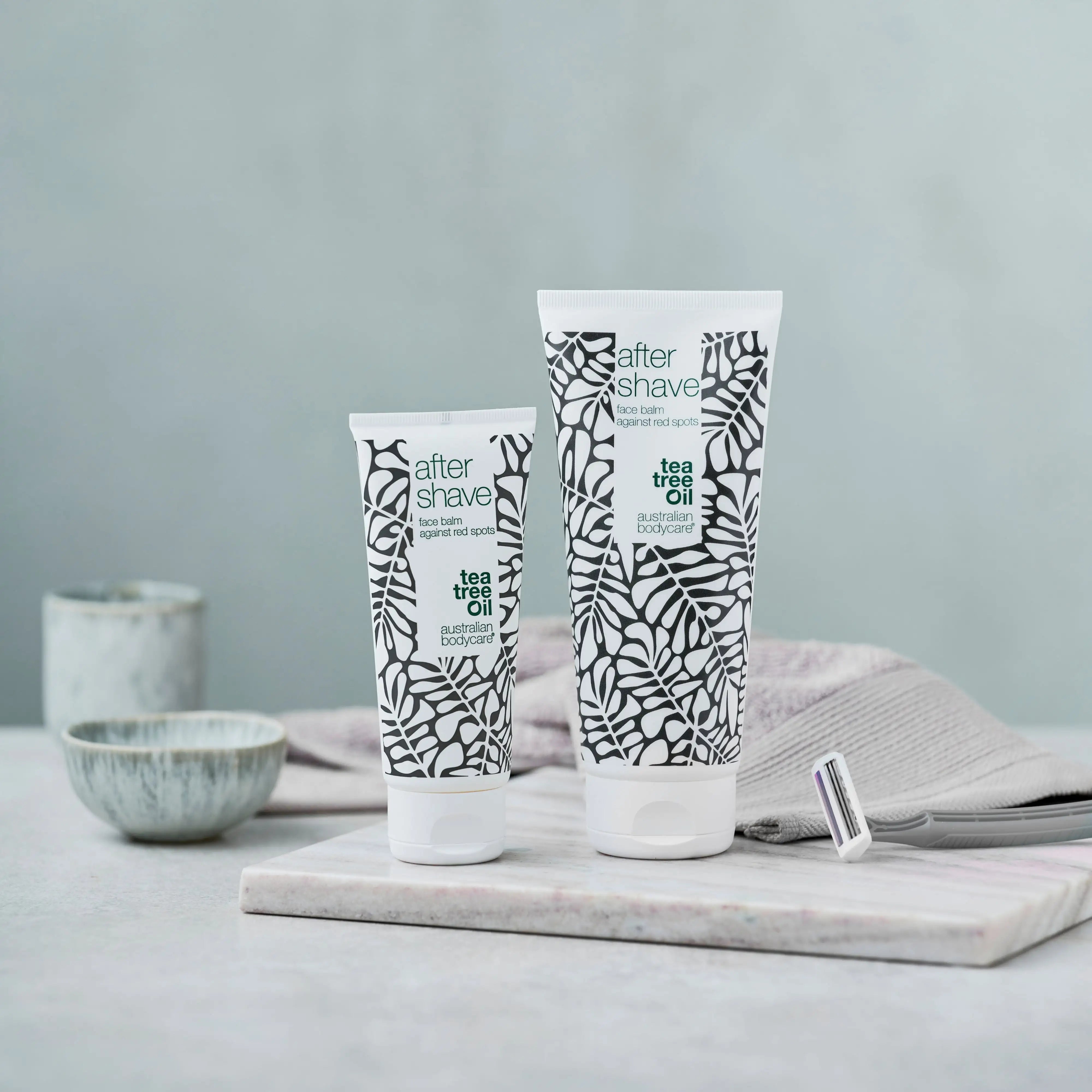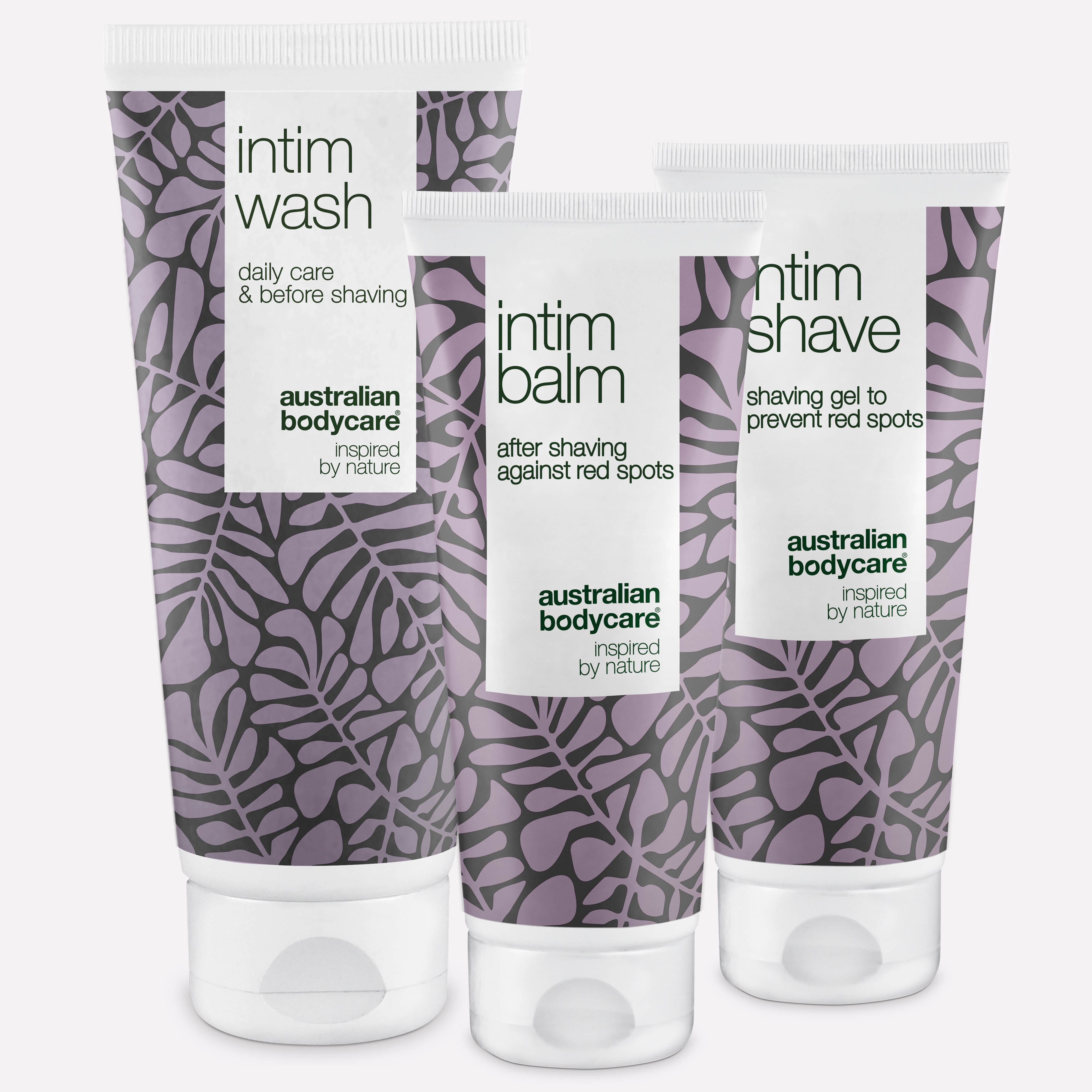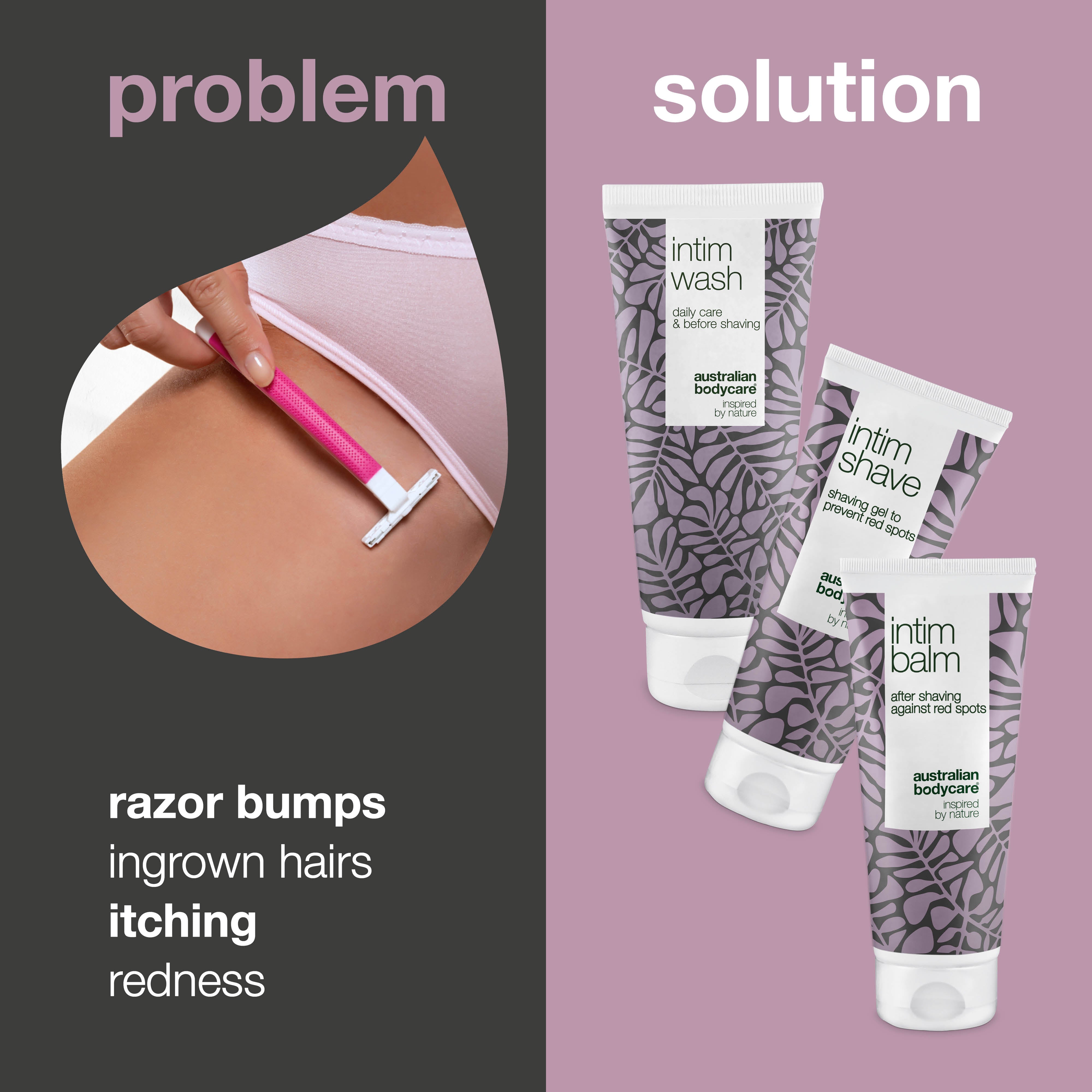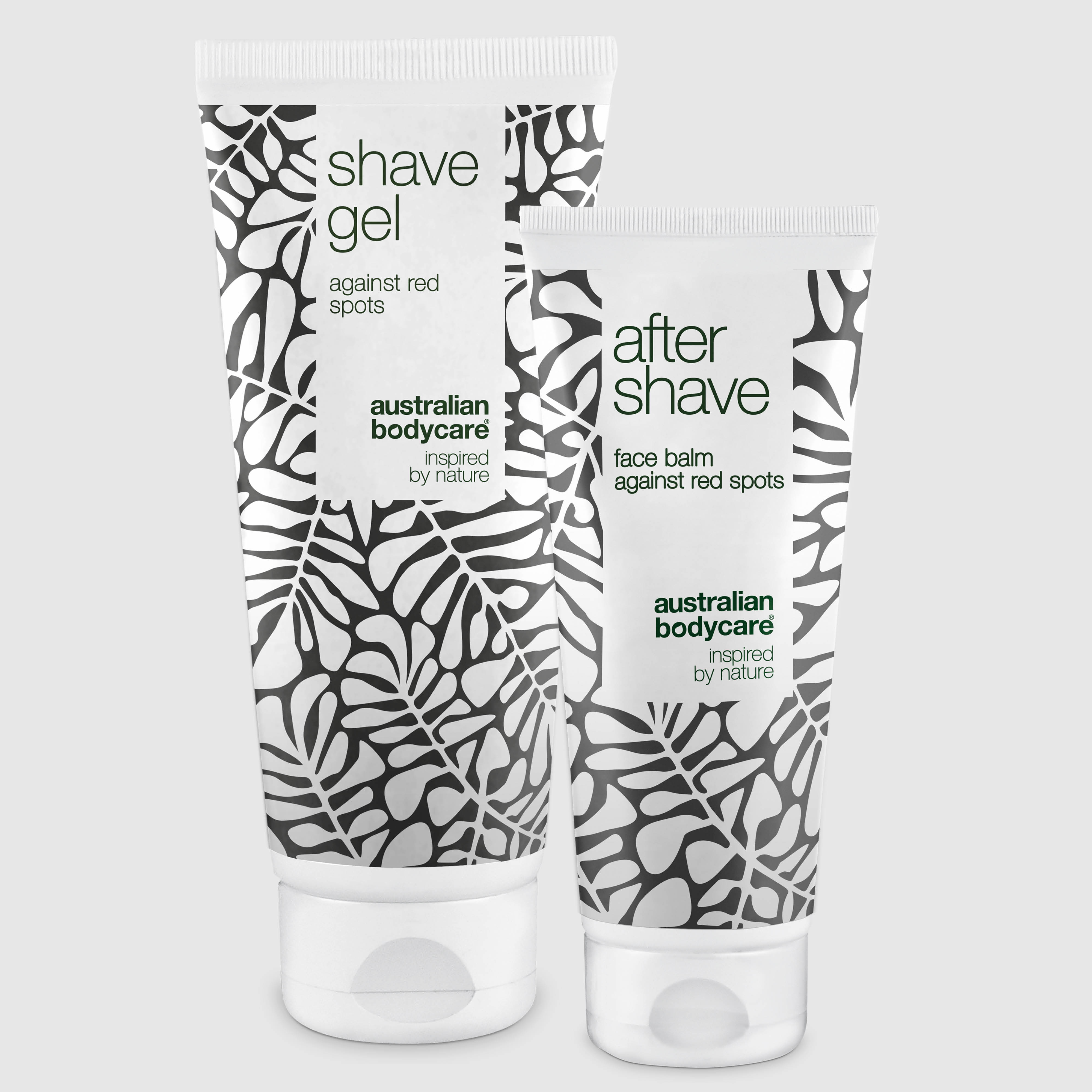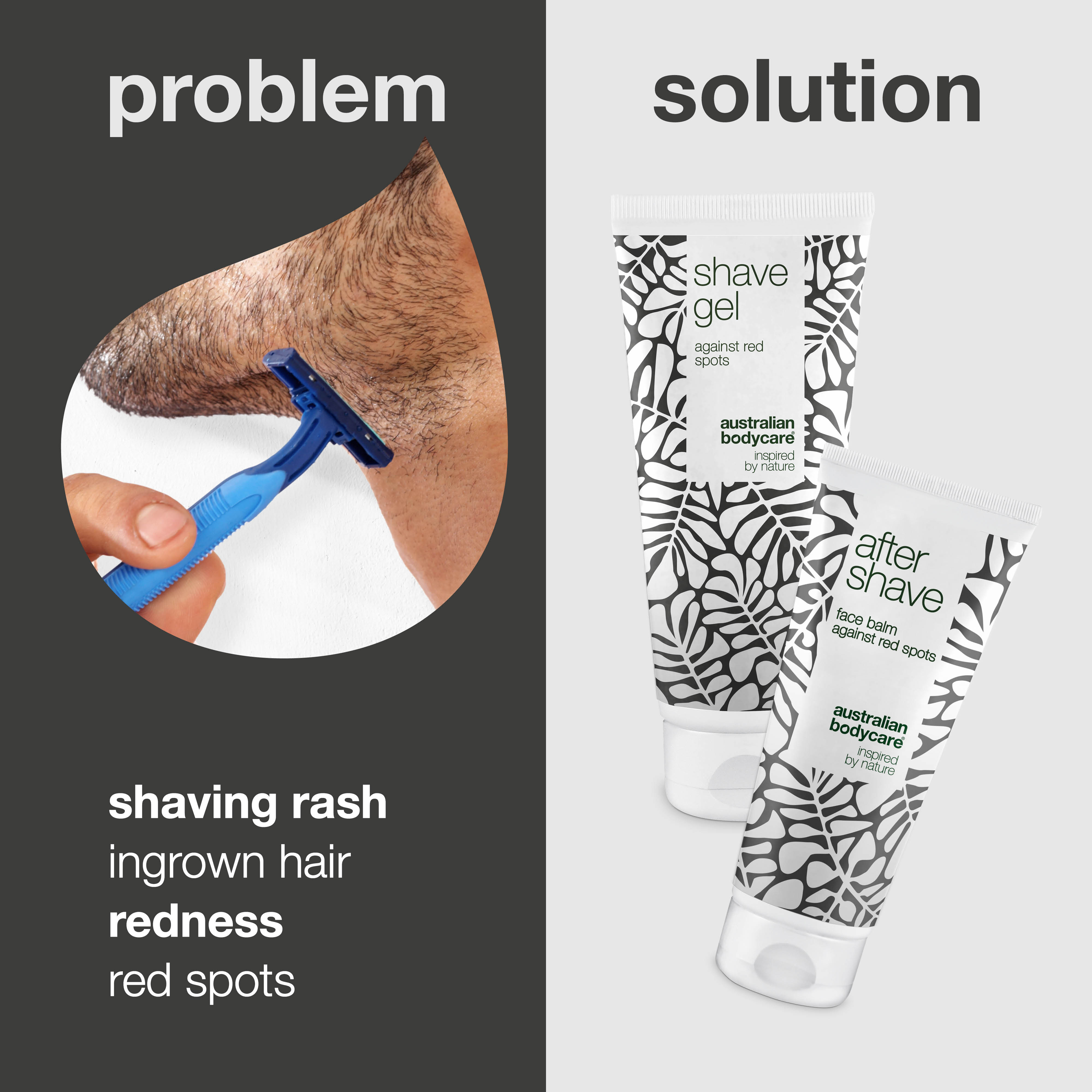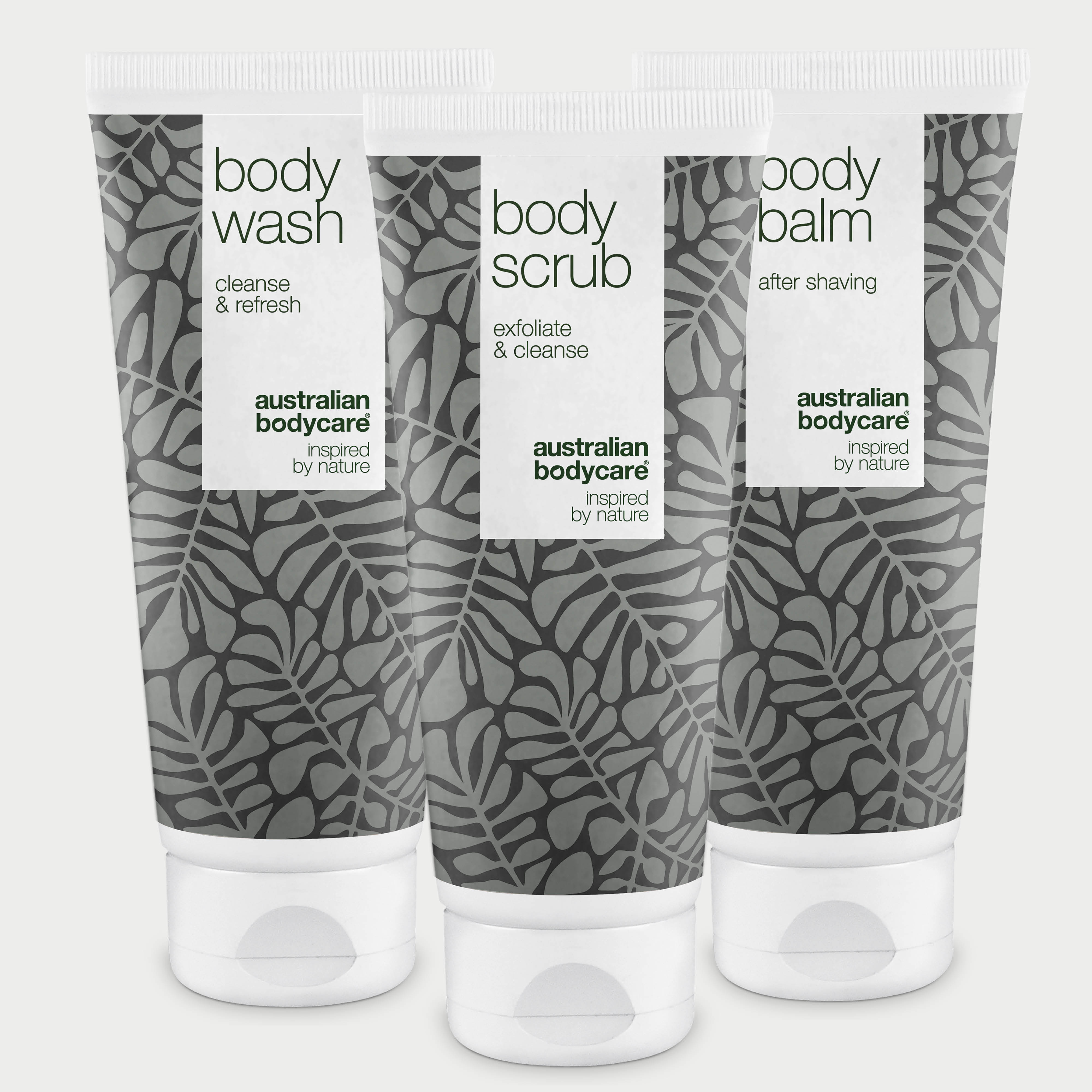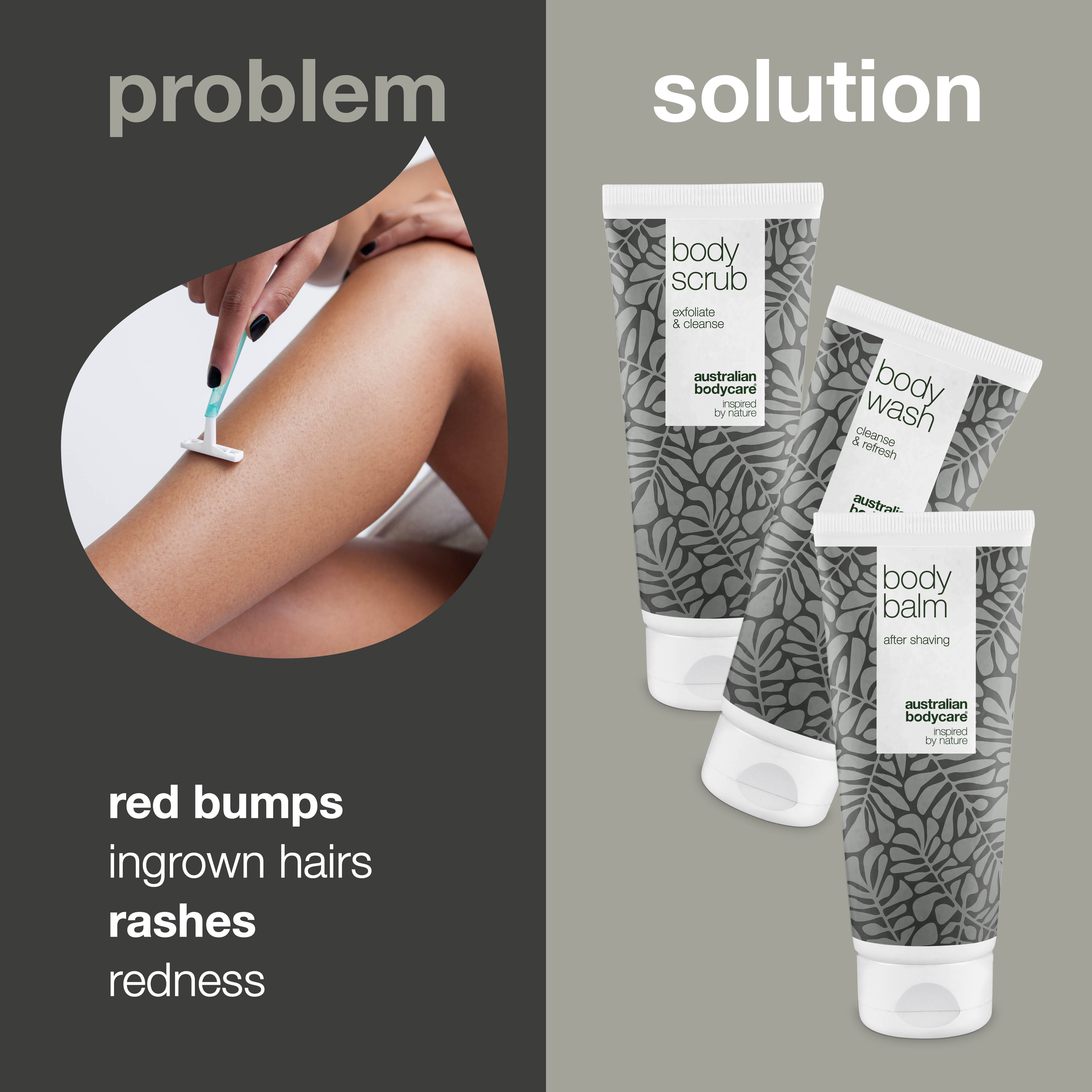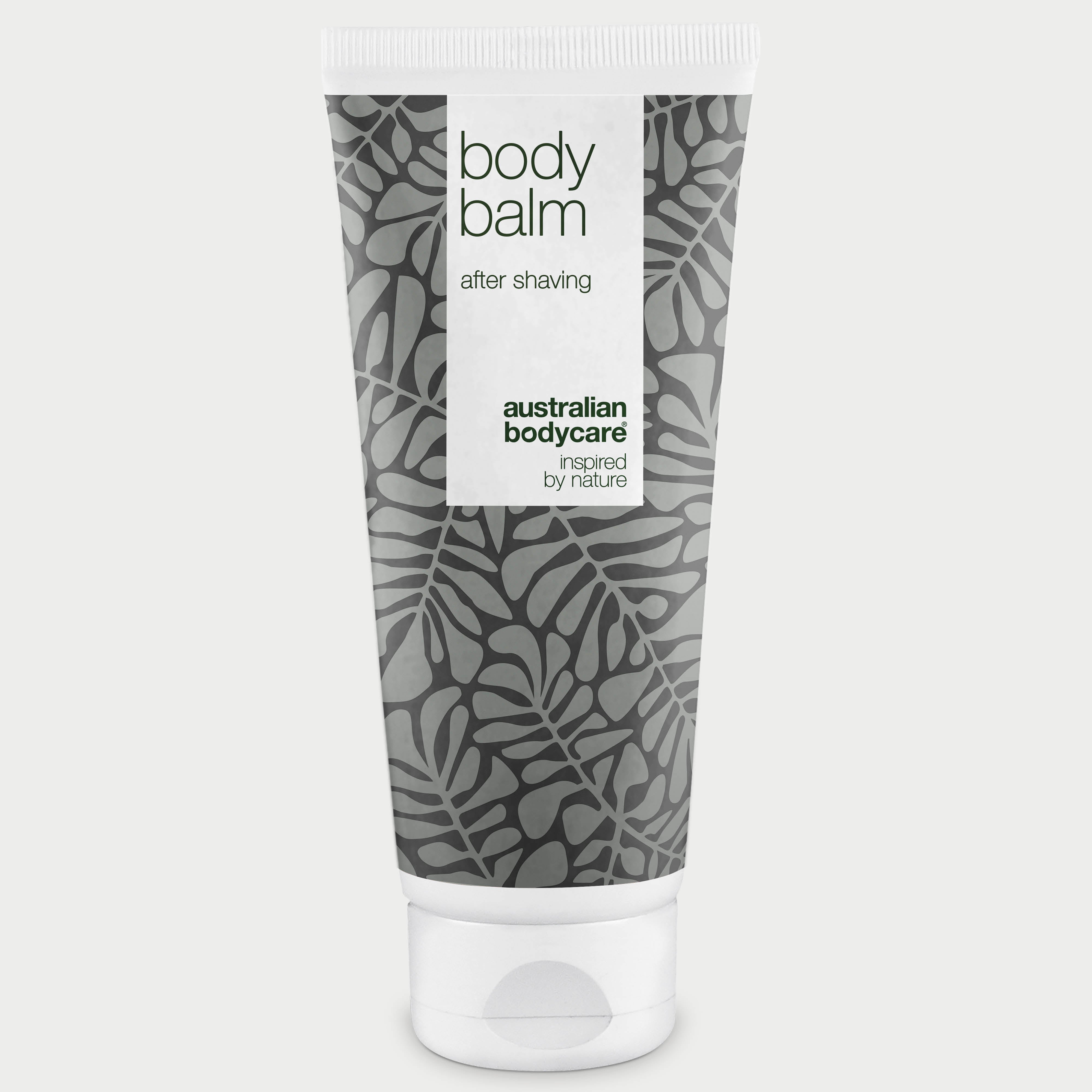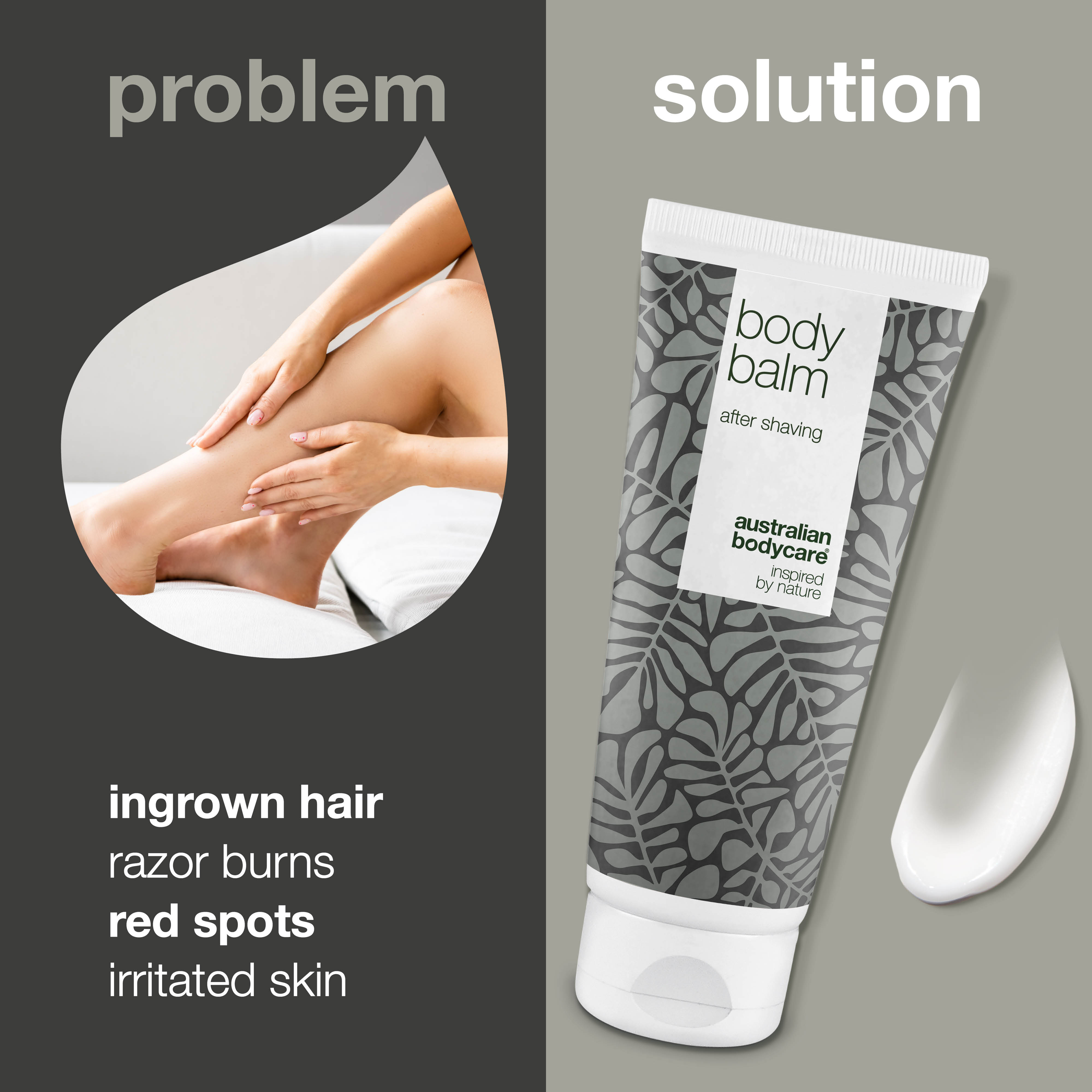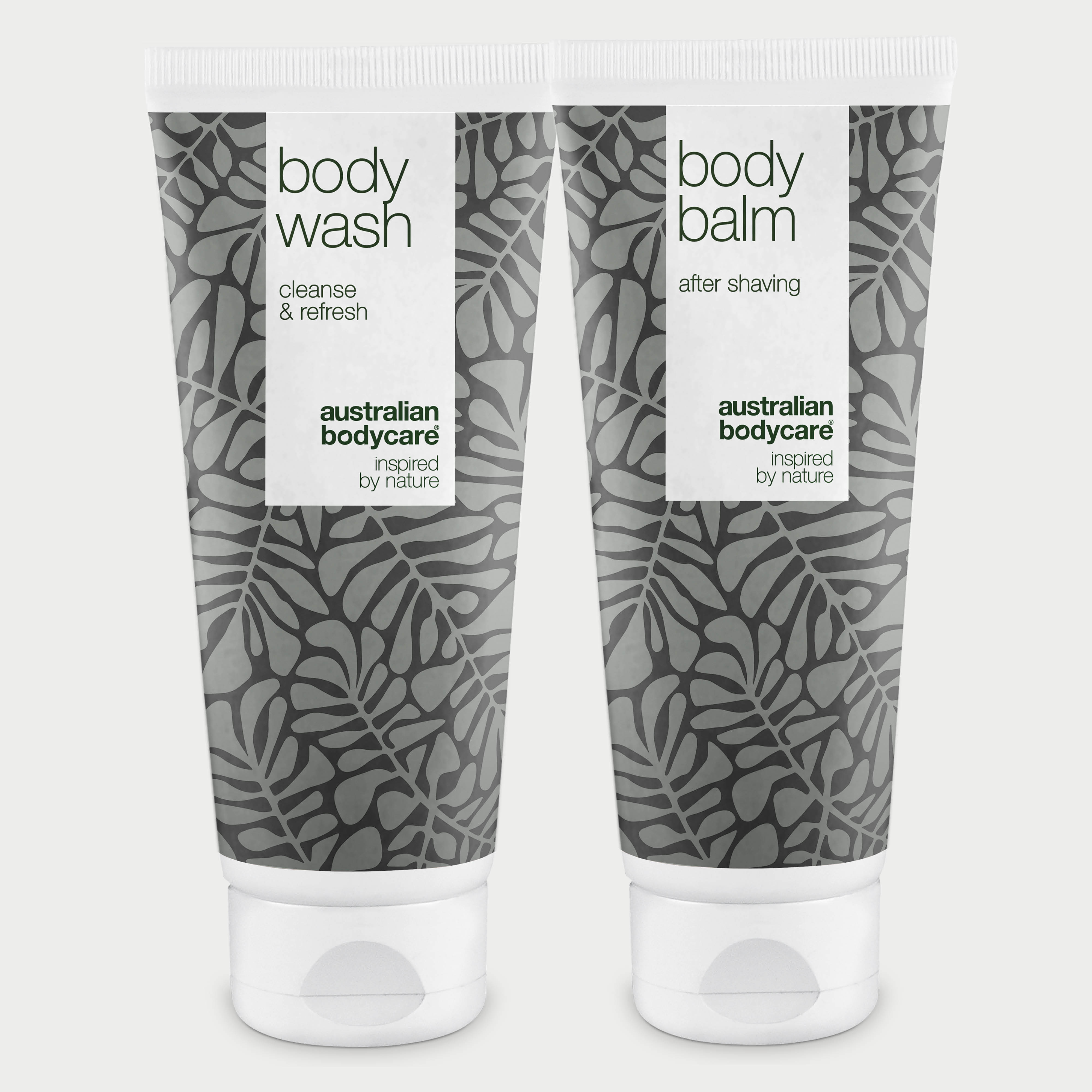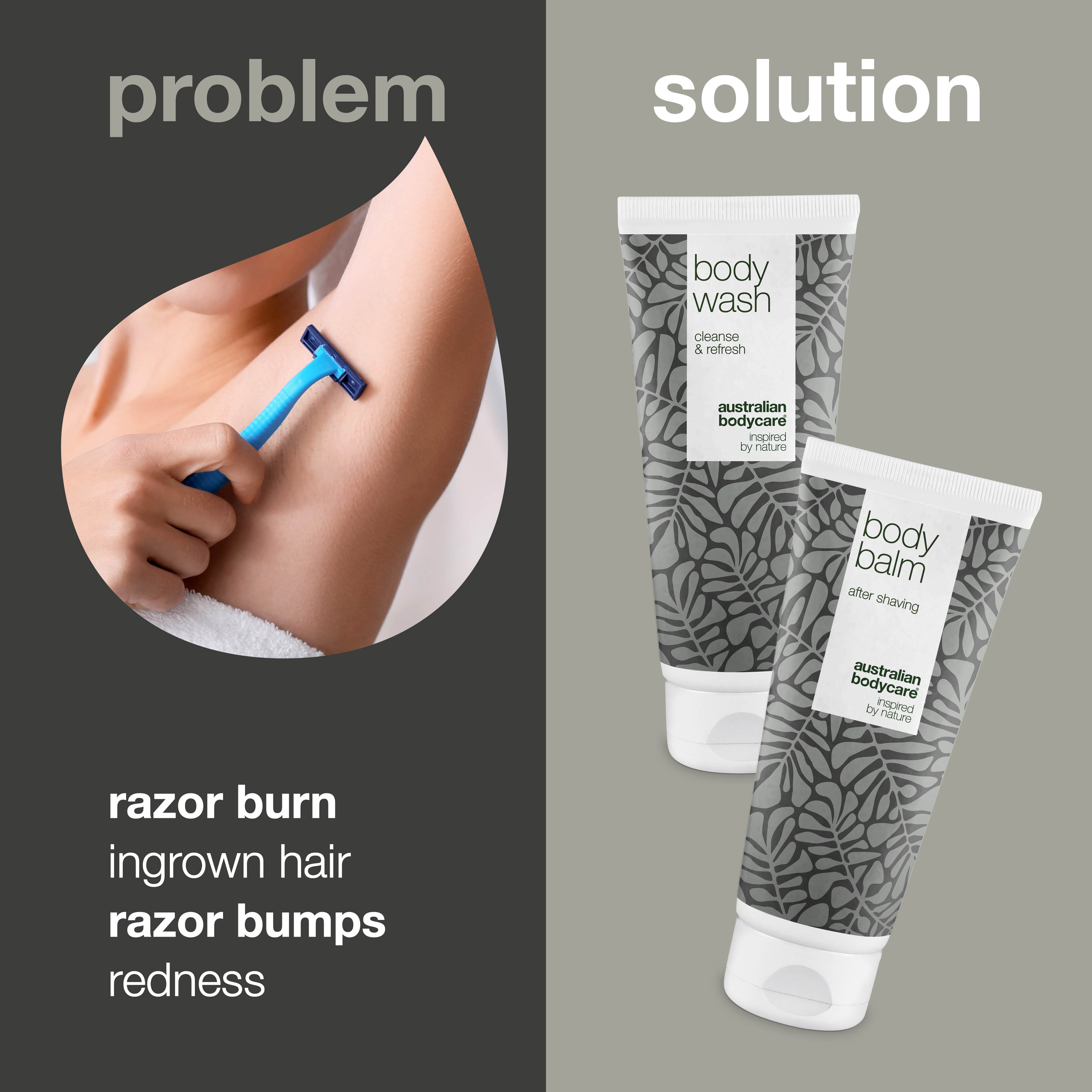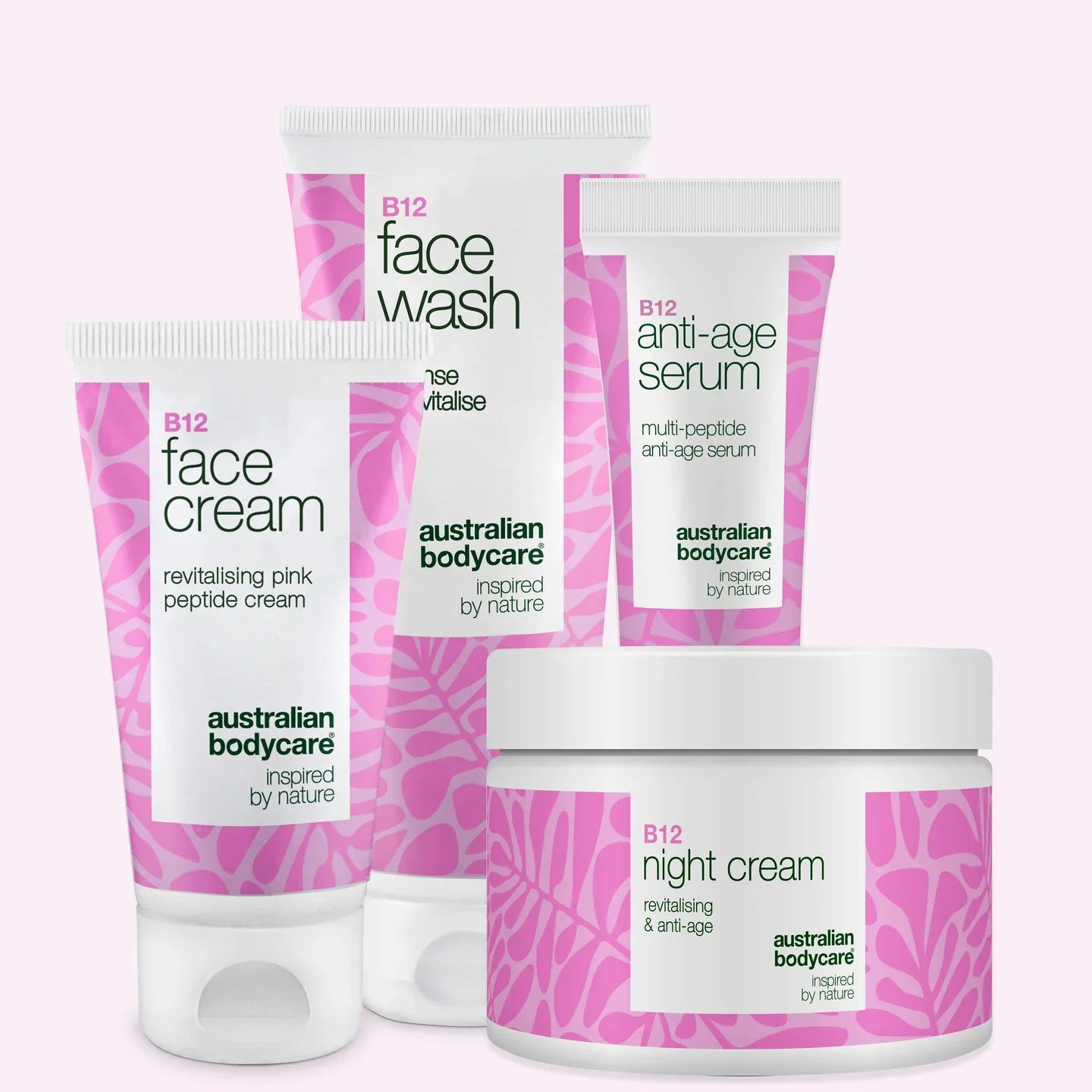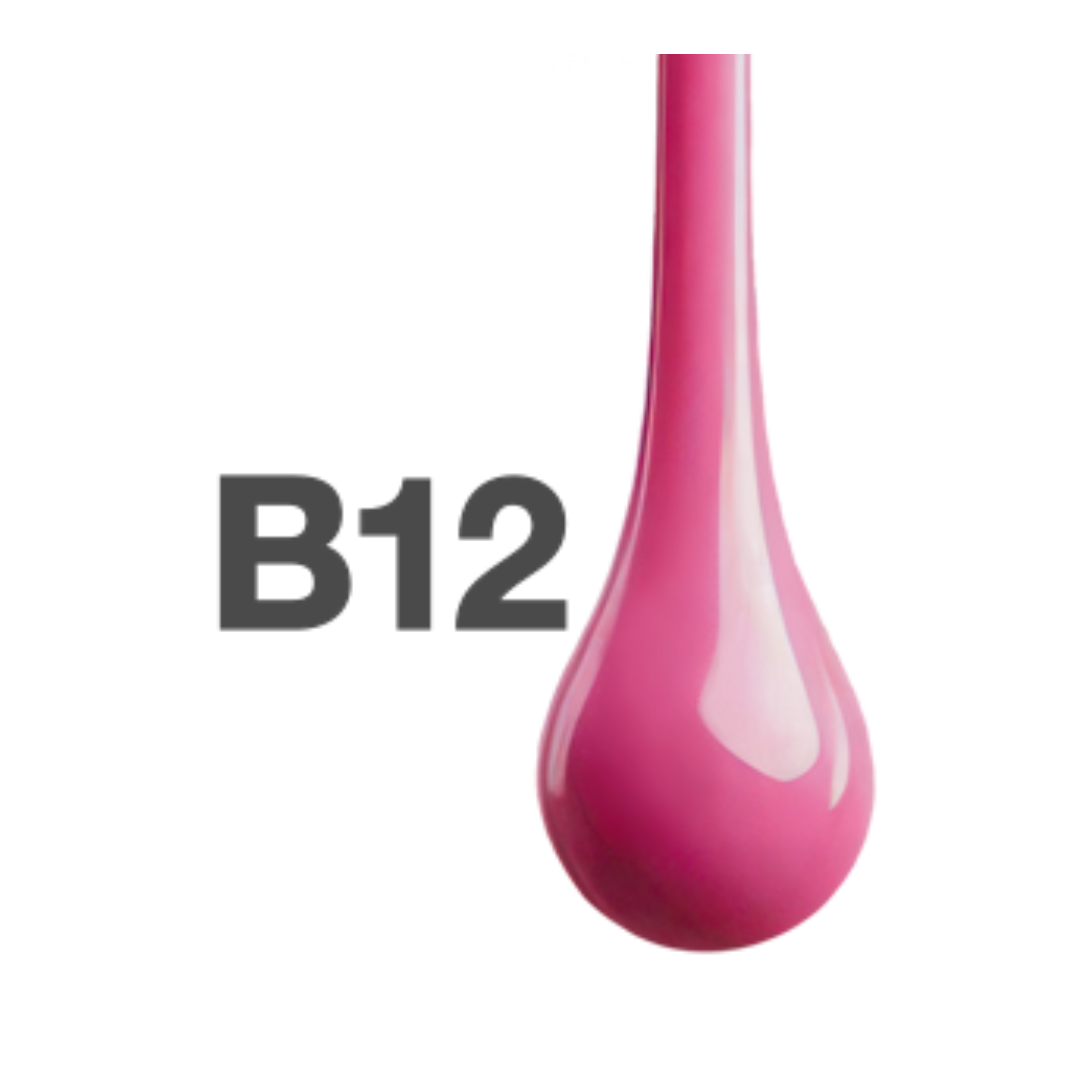Clean shave – avoid razor burn after shaving
Shaving is a nececity for many of us. Both men and women. However, it varies how much, and where we feel like it’s necessary to shave.
Here you can read about intimate shaving, shaving legs, facial shaving – and how you avoid the irritating razor burn after shaving.
Table of contents
Why do you get razor burn after shaving?
Wherever you shave, you can develop red bumps in your skin. These can occur after shaving facial hair, and when you shave your legs, armpits and intimate zones.
The annoying – and often quite painful and itchy razor burns occur due to beard plague. Beard plague is an inflammation in the skin, which occurs due to shaving or other types of hair removal.
Beard plague occurs, when there’s a bacterial infection and inflammation in a hair follicle, The razor burns, which are clear signs of beard plague, can develop into pimples filled with pus. In the worst case scenario, they can develop into boils.
For this reason it’s important to treat them with a product for Beard plague before they turn into problematic boils.
By following a collection of good advice, when shaving, you can do a lot of things on your own to avoid irritated skin and razor burns. If you should still encounter problems with razor burns after shaving, there are some great ways to treat them.
Jump straight to:
Shaving of legs – men and women
Problems with razor burn and pimples after shaving
Intimate shaving for women
The fastest, easiest and cheapest thing to do would probably be to allow the hair to grow everywhere. However, most woman aren’t fond of this idea. Instead, we grab our razors and fight the battle against unwanted hairs.
A lot of women are happy with shaving under the arms and on the legs. Others want to remove the hair in the intimate zones as well, either just the bikini line, or the whole area – removing all the hairs. Intimate shaving for women is often a must, especially amongst younger women.
Different methods for intimate shaving
There are many different methods for hair removal, the most common ones being shaving, waxing, hair removal cream, epilating, laser treatment or plucking. It’s difficult to perform a waxing session on your own intimate area, so in this case most people go to a beauty clinic.
Laser treatment is an efficient method, which removes the hairs more or less permanently, but it can also be quite expensive. This is probably why shaving is the most common method, because it’s an easy, cheap and fast method that you can use at home.
Shaving with a razor, shaving machine or epilator
When you want to shave in your intimate area, you can use a razorblade, a shaving machine or an epilator. There are pros and cons to all three devices.
A razor is cheap and easy to use. The disadvantage is that you might cut yourself. A shaving machine/ lady shaver is a bit pricier to get a hold of, but at the same time, the risk of cutting yourself isn’t as great.
An epilator is not cheap either. This is an electric machine, which grabs the hairs by their roots and removes them. This can be quite painful, and it takes time. However, it’s a better long-term option, where you remain free from hair for a very long time.
The disadvantage with all three ways of shaving, is that you risk having irritated skin with itchiness and razor burns after shaving. To avoid this, you need to make sure you treat the skin well, both prior to, and after shaving.
10 pieces of advice for shaving for women
- Put aside plenty of time, and make sure you’re able to see what you’re doing along the way.
- Make sure you soften your skin well with a hot bath, where you use a good, gentle soap. This will cleanse and soften the skin. Australian Bodycare intimate wash contains antibacterial Tea Tree Oil, so that the skins natural protection is restored. Intimate Wash contains lactic acid and Vitamin C from the cockatoo plum, which provides your intimate area with a fresh, clean feeling.
> Avoid razor burns in the future – read about the solution here - If you have quite long hairs, we recommend that you trim them first with a pair of scissors before you start shaving.
- Apply shave gel or shaving cream to the skin, before you get at it.
- Use a clean razor, a clean shaving machine or epilator.
- Start shaving with the hairs (in the direction which feels more comfortable) – and shave against the hairs once you’re done. Remember to wash the blade as you go along.
- Make sure to tighten the skin when you’re shaving, if not it will be too challenging to shave properly, and the risk of cutting yourself will increase.
- Wash the skin thoroughly after an intimate shave and finish it off with a good aftershave product, which is specially made for after-shave purposes. Many of our customers love our Intimate Balm, which contains antibacterial Tea Tree Oil, which is known for counter acting bacteria. It also contains extract from Tasmanian pepper, which calms the skin and helps towards irritation.
> Kit for intimate shave – avoid razor burns – click here - Avoid wearing tight underwear and underwear made from synthetic material right after an intimate shave, which can irritate the skin. A pair of loose panties made from cotton would be the best option.
- Do you experience little scratches after shaving? In that case they should be treated with an antiseptic product such as Body Balm or Body Lotion, which you can pick up at the pharmacy, at Boots or in a health and wellness store.
Different kinds of intimate shaving
When you’re talking about intimate shaving, a lot of different exotic names come up. The names cover different types of intimate shaving, where you remove different amounts of pubic hair.
A Hollywood hair removal removes all the pubic hair. A Brazilian hair removal removes most of the pubic hair, but leaves a little stripe or triangle of hair. A tanga hair removal or a Californian hair removal doesn’t remove as much, but enough for you to wear a tanga bikini.
Remember to treat the skin well before and after shaving
Shaving is hard on the skin. And intimate shaving in a very sensitive area isn’t any easier, this is something we can’t deny. However, once you’ve made the decision to shave, it’s important that you properly care for your skin, both before and after shaving. This way you can minimise or completely avoid irritated skin with itchiness, razor burns or ingrown hairs.
Before you start shaving, the skin must be softened. You can do this by taking a hot bath. Use an efficient intimate soap which counteracts bacteria, so that you soften and cleanse the skin before shaving. Once the skin is dry, you can use shave gel, shave foam or other products, made for shaving.
Once you have shaved, the skin should be properly rinsed, so that it’s clean. After this we recommend that you use an aftershave-products, which nourishes the skin. Some people prefer Intimate Balm, e.g. with Aloe Vera or Tea Tree Oil. Our intimate balm, is developed especially for after-shave purposes, due to the Tea Tree oil, which efficiently counteracts bacteria, as well as Tasmanian pepper, which feels soothing and prevents irritation. It’s important, that you find a product that works for your skin.
It might be a good idea to avoid products with added perfume, due to the perfume’s ability to cause skin irritation after an intimate shave.
The risk of intimate shaving
Besides the risk of razor burn, infections and inflamed follicles, some doctors will claim that women easier get infections in the intimate zone, if they shave, due to the hairs functioning as a natural barrier against bacteria. If you experience this, it might be a good idea to stop shaving.
READ MORE: Relieve vaginal itching
When intimate shaving becomes the topic of conversation, many people think of women. However, there are in fact many men, who choose to shave their testicles and intimate area. This is becoming increasingly popular amongst men, especially the younger generations.
When men and women choose to shave their intimate areas, the reasons behind it are usually cosmetic. There are no other good reasons to do it, because it’s actually quite hard on the skin. When you shave, you risk experiencing itch, razor burn and perhaps pimples or boils. We shave simply because we feel it looks better without hair. Of course, ideally, this would also result in a smooth, soft skin and not a red, irritated skin full of itchy bumps.
If you want to avoid skin irritation and red bumps after an intimate shave, it’s important that you take your time when shaving, also when it comes to pre- and post-shaving skin care.
Methods for intimate shaving
Most men grab the razor, shaving machine or trimmer, when they want to shave their intimate area. However, some men will opt to a wax treatment at a clinic. This is more expensive, more painful and takes longer – however, it also lasts longer. A laser hair removal treatment, which removes the hair more or less permanently, is a different method, which is efficient, but also quite expensive.
Intimate shaving with a razor, trimmer or shaving machine
Most men will choose to use a razor, a shaving machine or a hair trimmer for the intimate shave. You can easily use the same one that you use for your face, but in that case you need to remember to change the blade, or to clean it very thoroughly before and after shaving. Otherwise, you risk transferring bacteria from the face to the private parts – and the other way around. Make sure that the razor is sharp enough. You do more damage to the skin, if the blade is blunt and worn out.
In general, hygiene is a very important thing, while shaving. Besides this, it is important to treat the skin well and to move forward carefully, when you shave.
9 tips for intimate shaving for men
- Put aside some time, and make sure that you can see what you are doing along the way. You are more likely to cut yourself, if you’re in a rush.
- Make sure you soften the skin with a hot bath, while using a good, mild soap. This both cleanses and softens the skin. Our Body Wash contains antibacterial Tea Tree Oil, as well as glycerin, which moisturizes and cares for the skin. Avoid razor burns when shaving à Intimate shaving set
- Apply shaving gel or a shave cream before you get started.
- Use a clean blade or a clean shaving machine/trimmer.
- Start by shaving in the direction of the hairs (with the hair) – and thereafter you carefully shave against the hair. Make sure you rinse the blade many times during the process.
- Make sure you tighten up the skin while shaving, otherwise it will be hard to get a clean shave, as well as increasing the risk of cutting yourself. Take your time.
- Rinse the skin well after the intimate shave and finish it off with a good aftershave product, which is especially made for after-shave care. Many of our customers love our After shave which is developed for this exact purpose. It contains antibacterial Tea Tree Oil, which is known for counter acting bacteria, as well as extract from Tasmanian pepper which calms the skin and prevents irritation. Besides this, it also has a cooling, soothing effect on the skin.
- Avoid using tight boxer shorts right after an intimate shave, this may irritate the skin.
- If you experience small cuts and blisters, they should be treated with an antiseptic product, like our After shave, which you can buy at the pharmacy, at Boots or on our website.
Good treatment of the skin before and after shaving
Intimate shaving is hard on the skin. Especially the first time you do it, it’s not uncommon to have some obvious skin irritation after. After a few times shaving, the skin will get used to it. But if you wish to avoid or minimise skin irritation and the risk of developing razor burn, itch, ingrown hairs and pimples, it’s important that you properly care for the skin, before and after shaving.
Before you start shaving, you need to soften the skin. You can do this with a hot bath. Feel free to use a mild body wash in the intimate area, so that you both soften and cleanse the skin before shaving. Once the skin is dry again, you can use shaving cream, shaving gel or something else, that is made for shaving purposes.
Once you have shaved, you should get back in the tub or shower, so that remaining product can be rinsed off your skin. After this, you should use an aftershave-product that contains Tea Tree Oil, which efficiently removes bacteria, as well as Tasmanian pepper, which soothes the skin and relieves skin irritation.
Experiment with different products, until you find one that’s good for your skin. But avoid using the scented aftershave, which you might use for your face.
In general, you should try to avoid products with added perfume, as it can worsen skin irritation after shaving.
Many women choose to shave their legs, especially during the summer, where the smooth legs get shown off in shorts, summer dresses and bikinis. Most people don’t want to show off their legs if they’re covered in long, dark hairs.
There are also men, who choose to shave their legs. This could be due to the same cosmetic purposes as women, or because they are athletes and don’t want the hair on their legs to cause more resistance, when they ride their bikes or swim.
Watch this video about intimate shaving
Methods for shaving your legs
There are many different methods for hair removal on the legs. You can for instance use a hair removal cream, receive a wax treatment, get the hairs permanently removed with a laser treatment, remove the hairs with an epilator or do as most people do: shave the legs with a razor or shaving machine/ladyshaver.
Benefits of shaving your legs
Shaving is a simple, accessible and fast method. You can do it yourself at home – it simply requires a razor or shaving machine, so it is also a very cheap way to go about it. Once you’re done, you can see the result right away, and immediately after shaving, the skin is soft and smooth. This is also a pain-free method, unless you accidentally cut yourself in the process.
Some people prefer a razor, while other people go for a shaving machine. It depends on your preference, so you need to experiment and see what works best for you.
Disadvantages to shaving the legs
One of the disadvantages to shaving the legs is that the hairs quickly grow back, so you need to shave very often, if you want to be completely free from hair. Roughly every other day you need to get cracking. It’s simply a myth that the hairs get thicker when you shave them, but they feel thicker and harder, when they start growing out again after shaving.
The biggest disadvantage when it comes to shaving your legs with a razor or a shaving machine is that you risk getting an irritated skin with red, itchy razor burn and ingrown hairs. This isn’t uncommon, but it doesn’t look very nice either.
Many people experience something that almost resembles a rash after shaving their legs. This isn’t eczema, but a kind of beard plague. It’s an inflammation in the skin, which can occur after shaving, if there is a bacterial infection and inflammation in a follicle. The red bumps on the skin can develop to boils, filled with infected pus. This rarely happens on the legs, so if your legs are in a bad state after shaving you should check with your doctor.
5 Good tips for leg shaving
- Soften and cleanse the skin on the legs, before shaving them. You can easily do this with hot water and a mild soap which removes bacteria. Our Body Wash contains antibacterial Tea Tree Oil, as well as glycerin which moisturises and cares for the skin. Body Wash is perfect for washing your legs pre-shave.
- Use the shaving soap and shaving cream on the skin, before shaving. This way you won’t harm your skin as easily.
- Once you’re done shaving your legs, you should rinse of leftover product, before using a good, nourishing aftershave cream. Australian Bodycare Body Balm is developed exactly for after-shave use. It contains the antibacterial Tea Tree Oil, as well as Tasmanian pepper, which feels calming and soothing and prevents skin irritation.
- Make sure you exfoliate your legs once a week or so. This will remove the dead skin cells, so that you don’t develop as many red bumps and ingrown hairs.
- Use a clean razor blade every time you shave, and avoid sharing it with others.
Problems with razor burn and pimples after shaving
Shaving and hair removal is a necessary errand for many of us, but that doesn’t make it good for the skin. Running a blade towards the skin is hard on the skin. Often it will cause a later reaction with red and itchy bumps or razor burn, which later develop into pimples.
But why do you develop razor burn and pimples after shaving, how can you avoid them and how can you treat them if they do occur. We will look closer into this here:
Why do you get red bumps and pimples after shaving?
No matter where you shave – whether its in your face, on your legs, on your back, in your armpits or in your intimate area – you can risk developing razor burns and red bumps on the skin.
The red bumps, which often itch and hurt, are there due to beard plague. This is a state of inflammation in the skin, which occurs due to shaving or other types of hair removal.
Beard plague can occur anywhere on the body, where there is hair – and where you remove hair through shaving. Beard plague is also known by the Latin name pseudo folliculitis barbae. Like the name suggests, it’s about something that occurs when shaving.
Beard plague occurs when there’s a bacteria infection and inflammation in a hair follicle. The red bumps on the skin is a clear sign of beard plague, and can develop into pimples filled with inflamed pus. And in the worst case they can develop into real boils.
The red bumps can occur anywhere you shave, and the same goes for pimples. It’s not just the face that is subjected to pimples after shaving, you can also experience this on your legs, in your intimate area, in your armpits, on your back and anywhere else where you’ve used a razor blade.
We all have bacteria and fungus all over our body and on our skin. It’s completely normal and nothing to worry about. But when bacteria enters a follicle, the follicle can get infected and an inflammatory state occurs. Usually it’s the bacteria staphylococci or streptococci, which causes the inflammation. For this reason, you can accidently transfer bacteria into the follicles while shaving.
How can you avoid developing red bumps and pimples after shaving?
If you want to be completely sure to avoid the red, irritated razor burns, you can avoid shaving at all – or shave less often, so that your skin has time to recover after shaving.
If this is not the right solution for you, there are luckily also other opportunities to prevent the occurrence of red bumps and pimples after shaving.
First and foremostly it’s about taking good care of your skin and care for it before and after shaving – as well as in between shaving. Also remember to use clean shaving equipment – and avoid sharing it with others, so that you don’t experience beard plague.
Before shaving, you can prepare the skin by washing and cleansing it with hot water and a mild body wash, such as Australian Bodycare Body Wash, which efficiently counteracts bacteria and restores the skins natural protection. It softens the skin and makes it easier to shave the skin without damaging it. Once the skin is clean and dry, you can use shaving gel or cream on the skin, before beginning to shave. This disinfects and minimises the risk of damage to the skin.
When you are done shaving, you should make sure you rinse excess products off the skin, before applying a good after-shave cream. Many appreciate products that contain Tea Tree Oil or Aloe Vera, which are known for being gentle on the skin, as well as counteracting bacteria. We recommend our Body Balm which are developed for after-shave purposes. It contains the anti-bacterial Tea Tree Oil, as well as relieving and moisturising your skin.
It might benefit you to use an exfoliating cream on the skin once per week. Exfoliation helps you remove dead skin cells, so that you don’t develop red bumps and ingrown hairs as easily.
How to treat red bumps and pimples in the skin after shaving?
If you have developed red bumps and pimples after shaving, there is luckily a few different things you can do in order to reduce the symptoms.
The red bumps will in some cases disappear on their own after a period of time. The same goes for pimples. But you can also risk infecting yourself with beard plague, if you don’t do anything about the red bumps. By treating the small bumps, you can prevent the irritated red bumps or pimples from developing.
By using a cream after shaving, which counteracts bacteria – a cream like Body Balm – you can avoid red bumps and pimples from the get-go.
If you experience little wounds or scratches after shaving, they should be treated with an antiseptic product, which you can buy on the pharmacy, at Boots or in our web shop. Australian Bodycare Face Balm contains the antibacterial Tea Tree Oil, as well as extracts of Tasmanian Pepper which prevents irritation and soothes skin.
There are multiple different natural ingredients that have an antiseptic (bacteria resistant), soothing, anti-itch effect. These are all the qualities that can come in handy, when you’re suffering from Beard Plague. Some natural ingredients include lavender, Tea Tree oil or aloe vera. Some creams and aftershave products include these ingredients. You can also find oils with lavender, aloe vera or tea tree oil, which you can apply to the skin in a diluted state.
You can find the different natural products at Boots and health and wellness shops, where you can also receive good advice and guidance on how to use it.
facial shaving
Do you belong to the group of men, who don’t want to grow a beard? In that case, there’s no way to get around the daily or weekly facial shave. Most men use a razor blade or a shaving machine. But you also have people who use an old-fashioned shave brush and knife. It’s not common to switch between the different methods – most people have one that they prefer.
Put time aside for shaving
Many people who use a razor blade, choose a disposable one-time-use blade, grab some shaving cream and get it over with. Those who choose a shaving machine, often do the same thing, but skipping the shave cream. Some people remember to care for the skin after with after-shave products, others forget.
You also have those, who turn shaving into a proper, old-school shaving ritual with pre-exfoliation of the stubble, homemade shaving cream, applied with a great shaving brush and shaving with the right kind of knife. Before and after they use a hot towel to soften the skin.
Whether you opt for option A or B, it will always make sense to put aside some time for shaving. This is something they always did properly in the olden days, where shaving was something done with a brush and a knife. However, the fast-paced world we’re living in has offered new methods, like a razor blade or shaving machine - which are less time consuming.
Some men feel like they have more control of the shaving process when they use a razorblade. Other men feel like it’s faster and quicker to use a shaving machine. So, it really comes down to individual preferences and what works best for you.
Problems with red bumps after shaving your beard
Whether you’re using a razor blade or shaving machine, you can experience problems with red bumps and pimples in your face, on the chin or neck after shaving - also well known as Beard Plague. Some men experience that they have less skin problems when they use a shaving machine, whilst some have the opposite experience. So, you really need to experiment and choose the method that works best for you.
The best thing you can do in order to avoid red bumps and pimples, is to properly care for the skin. Before shaving, you can rinse the skin with a Face Wash and warm water. Our Face Wash contains the antibacterial Tea Tree Oil, which counteracts bacteria and is great to use before shaving. While shaving you can use shaving gel, if you’re using a blade. After the shave it’s important that you use a good, nourishing aftershave cream, so that you don’t leave the skin dry exposed. Our Face Balm is especially developed for after-shave purposes. It contains antibacterial Tea Tree Oil as well as Tasmanian Pepper, which soothes and prevents irritation, which often occurs after shaving.
Shaving of back hair
If you belong to the group of men, that struggles with back hair, you can either leave them be or grab a razor.
When you shave your back, you need to follow the same rules as when you shave any other part of your body. You need to make sure you prepare the skin well before shaving – and you should also properly care for the skin after shaving.
Shaving eyebrows
Eyebrows are a very visible part of our face, so if you would like to trim them, you need to be aware of what you are doing. It’s easy to shave off too much, and brow hairs don’t grow back immediately.
Perhaps you simply would like to shave your eyebrows, because they are big and bushy, or maybe you want to shave them in order to follow the trend of eyebrow shapes. Whatever reason you are doing it for, you need to go about it carefully.
Shaving your armpits
Most women don’t want to be seen with hair in their armpits, if that is the case there is no other option than hair removal. Many choose shaving, because it’s fast, easy and cheap. It’s an excellent method, but just like any other area on the body, you can also risk developing razor burn on the skin after shaving.
In order to avoid red bumps, itch and pimples it is important that you use shaving cream when you shave, and that you remember to care well for the skin after shaving. Our Body Balm is good to use after shaving your armpits, due to the Tea Tree Oil, which counteracts bacteria, as well as Tasmanian Pepper which has a soothing, calming effect on irritated skin. After hair removal in the arm pit, we recommend using a good deodorant without aluminium.
Exfoliation of the skin
In the battle against red shaving bumps and pimples, exfoliation can be a good tool. When you’re exfoliating the skin, you remove dead skin cells, which provides a healthier skin, with less red bumps and pimples.
You don’t need to exfoliate the skin every day, but feel free to do it once or twice per week.
Read more about exfoliation here.
Q&A about shaving
How can women shave pubic hairs?
Shaving pubic hairs can also be called intimate shaving. When you’re going to shave the intimate area, you need to do it carefully and precisely, the same way you shave other areas on your body. The skin in this area is very sensitive, so take extra care when shaving, and make sure you care for your skin both before and after shaving. Most people choose to use a razor blade or shaving machine/lady shaver.
How can men shave pubic hairs?
When men want to remove pubic hairs, most men choose to use a razor blade, shaving machine or hair trimmer. Make sure you tread carefully, so that you don’t hurt yourselves. Remember to prepare the skin for shaving and to care for it afterwards.
How do you avoid itchy skin post shaving?
Itch and razor burn after shaving is a very common problem. The best things you can do in order to avoid it, is caring for your skin, before and after shaving. Itch and red bumps are a symptom of beard plague, which occurs, when a bacteria infection and inflammation occurs in a follicle.
How do you avoid razor burns after shaving?
If you want to avoid red bumps after shaving, you should make sure you properly rinse your skin, before shaving. Use shaving cream while shaving, and finish it off with a good after-shave cream when you’re done. Feel free to choose a perfume-free cream with a bacteria-resistant effect.
Why do you get red bumps after shaving?
The red bumps occur due to beard plague, which occurs, when there is a bacterial infection and inflammation in a hair follicle. The red bumps are the visible signs of beard plague.
How often should you shave?
If your skin were to choose, it would want you to shave as little as possible, because shaving is hard for the skin. However, there are no rules, and you should shave as often as you feel necessary. Just make sure you take good care of your skin, whenever you do shave.
How fast does hair grow back after shaving?
Hair grows constantly, but how fast this happens, depends on the person. Whenever you shave, you’re cutting your hair off at the surface, which means it will soon be visible again. Do you wish to avoid visible hairs? in this case you need to shave daily or every other day.
How to stop bleeding after shaving?
If the skin is softened and warm, when you start shaving, you won’t cut yourself as easily. Should it still happen, you can stop the bleeding by applying a liquid with a little bit of alcohol in it, tea tree oil, a special cream or by using an alum block, which is a crystal-like stone, which soothes and heals.
How do you avoid pimples after shaving?
The easiest way to avoid pimples after shaving, is simply to care for the skin after shaving. Use a good aftershave cream, which cools, heals and nourishes at the same time, as well as counteracting bacteria.
Is intimate shaving dangerous?
Whether you’re a man or a woman - It’s not considered dangerous to shave your intimate area. However, it goes without saying, that you should avoid cutting yourself, when you shave. You also need to take good care of the skin, both prior to and after shaving, so that you don’t get infections inflammations, which in the worst case can lead to inflamed boils.
What is better: shaving or waxing?
There are benefits and disadvantages to both shaving and waxing. Shaving is easy, fast and cheap, but the effect is not as long lasting. When it comes to wax treatments the hairs are removed for a longer period of time, but the treatment also takes longer, is more expensive and can be experienced by many as very painful.
What is intimate shaving?
Intimate shaving is when men or women remove pubic hairs by the method of shaving.
Intimate shaving for women
READ MORE : Intimate shaving for men
READ MORE : Intimate shaving for women
Can you use soap for shaving?
It’s good to watch soap to wash the skin before shaving. This way you cleanse and soften the skin before shaving. When you shave, you should use shaving gel, which is especially made for shaving.

